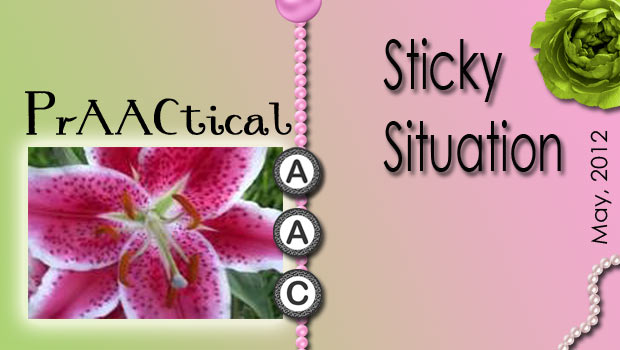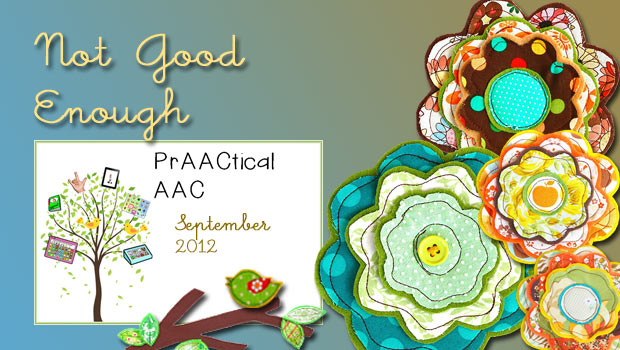Sticky Situation

–/rant%20ahead.jpg)
Awhile back I heard from a frustrated student SLP who was in despair over a clinical placement. Great kids. Lots of opportunity for AAC. Experienced supervisor. Motivated student.
—
So what’s the problem? In this case, it was a student who knew more than her supervisor about AAC. Talk about a sticky situation! Ugh!!
–
Cleo Clinician felt that if she didn’t use AAC with her young clients, then she wasn’t putting her knowledge of best practices to use and, in the end, the children would be the losers. On the other hand, if she pushed her experienced but somewhat rigid supervisor on the issue, Cleo feared a defensive response. She didn’t want the kids to lose out, but Cleo didn’t want to get on her supervisor’s bad side, either.
—
So what’s an aspiring clinician to do?? Here are a few tips.
—
1. It’s not what you say, it’s how you say it. Respectfully. With deference and a slice of humble pie . There’s a world of difference between ‘That’s not the way I learned it’ and ‘It would be great to have a chance to try out some of the things I learned.’
2. Try the naive-and-enthusiastic approach. “Mr. IveAlwaysDoneItThisWay, our class last night talked about using activity schedules for kids with ASD so I made this one for my art activity with Justin. I hope that’s okay. I can’t wait to try it with him!!” Kind of makes it hard to resist.
3. Show appreciation. “Thanks so much for letting me try that. I have such a better understanding of the process now, and see where I need to make some changes. I made a couple little tweaks so I can try it again next session.” A little gratitude goes a long way.
4. Talk positively about it to others. “Ms. MoreOpen, did I tell you about my session with Justin? Mr. Ive let me try some things that I am learning about activity schedules with him and he attended so much longer! I can’t wait to use it again next time and see what happens!” You’d be surprised how far a little bit of flattery will take you.
5. Get some support. Touch base with a university supervisor, mentor, former professor, or other professional that you trust and talk this through. They can help you sort this out and figure out the next steps so that you are engaging in ethical practices, have a solid clinical experience, and make a positive impact on the children. Reach out: There’s nothing to be gained by suffering in silence.
6. Commit to doing it better when you’re in charge. Once you’ve had this kind of experience, vow that you’ll be the kind of clinician who stays up to date with changes in the field and uses evidence-based practice throughout your career.
–
–
—
Filed under: PrAACtical Thinking
Tagged With: rant
This post was written by Carole Zangari



6 Comments
Thank you for your post….I will use your suggestions if I am ever in the same type of situation.
Hope it is helpful, Nicole!
Thank you for this blog. It has helped my family more than you will ever know! Thanks to you, I’ve actually been in this situation (where I might just know more about AAC than my child’s SLP) and I’m just a parent. I usually try the naive, enthusiastic thing and point them in the direction of this blog. Thanks for writing and sharing each day!
Thanks for your kind words. We’ve learned SO MUCH from some of the parents we’ve worked with that it is nice to be able to give something back. We’re all in this together!
I definitely found myself in similar situations when I was a student. I think those are great tips that I wish I had known and used a couple years ago!
Kaci, it is a terribly awkward position to be in, and I really feel for our students/grads who find themselves in that situation. Glad to hear that you lived to tell the tale and that their lack of support didn’t dampen your enthusiasm for AAC. Thanks for taking the time to comment. Much appreciated!